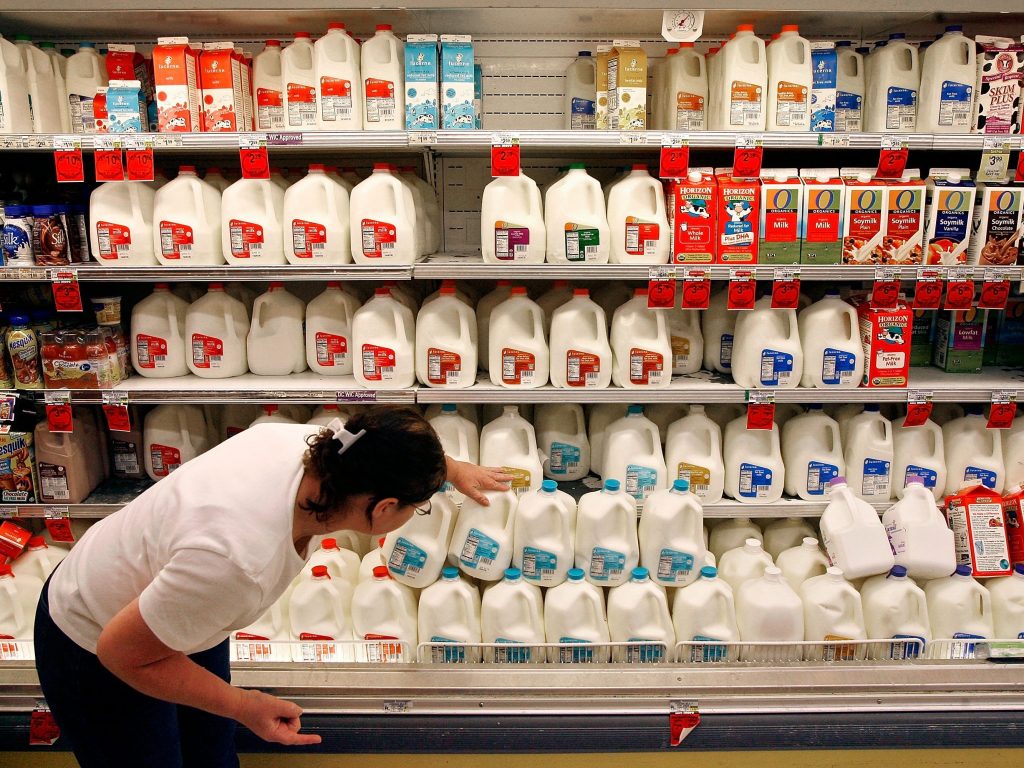- Drinking a gallon of milk a day to quickly gain muscle mass and fat has long been a fad diet.
- Dietitians said the diet is a quick fix that will not lead to long-term changes in body composition.
- The GOMAD diet can increase the risk of heart and kidney problems.
Milk is having moment among young people like Angus Cloud and Jojo Siwa — and some fitness bros participating in the GOMAD diet, or "gallon of milk a day."
The GOMAD diet — popular since the early bodybuilding days in the 1940s and 50s — promises a quick way to put on muscle and weight due to milk's high protein and saturated fat content. Eating in a calorie surplus is the best way to build muscle, as your body will break down muscle tissue to get energy if you eat to little.
Though experts recommend building muscle to strengthen bones and improve heart health, the GOMAD diet represents the dark side of weightlifting. The desire to achieve a muscular, "swole" physique had pushed many fitness influencers to take performance-enhancing drugs (PEDs) in secret, despite their negative health effects. An estimated five to 10 million people have body dysmorphia, a mental health condition that causes intense distress about one's appearance.
Speaking to Insider, three nutritionists said they believe — or hope — the GOMAD diet is just a fad that will die out. While they all agreed that the GOMAD diet will likely deliver on the promise to quickly gain weight, and milk is rich in nutrients, they said there are obvious downsides and serious risks to consuming that much milk.
How the GOMAD diet works
Robin Barrie Kaiden, a registered dietitian and certified personal trainer, said the motivation behind the GOMAD diet likely comes from a desire to put on muscle mass quickly.
Muscle building requires eating enough calories and protein. Not only does eating at a calorie surplus help with muscle building, strength training can boost your metabolism, as muscle burns more calories at rest. Not eating enough protein can also impede muscle building, as the macronutrient helps repair tears in muscle fibers during workouts.
Some people find it difficult to eat as much is required to gain muscle mass, Kaiden said, and drinking calories is often easier than eating. A gallon of whole milk contains 128 grams of protein and a whopping 2,400 calories.
Kaiden said the GOMAD diet could help build muscle, but the excess calories can also lead to gaining fat, as the calories the body does not use in a day gets stored as extra fat.
Another draw to the GOMAD diet is its convenience for people who do not cook or meal prep, said Amy Stephens, a registered dietitian and certified specialist in sports nutrition. But learning how to eat a balanced diet will lead to long term, sustainable body changes, Stephens said. Results from the GOMAD dieter will likely dissipate as soon as the dieter stops drinking milk.
"This is obviously a quick fix, because diet diet culture loves quick fixes," Kaiden said.
The dangers of drinking a gallon of milk a day
Not only is the GOMAD diet ineffective at providing a way to build and maintain muscle in the long-term, consuming a gallon of milk a day leads to numerous health problems, some of which can be life threatening.
Stephens said a gallon of milk contains four times the daily allowance of saturated fat, or fat molecules found in animal products and tropical oils. Though saturated fat may not be as unhealthy as previously believed, too much of it can raise a type of cholesterol that increases the risk of heart disease.
A gallon of milk contains nearly all of the daily recommended amount of sodium and high amounts of calcium, said Jason Machowsky, a board-certified sports dietitian. Too much sodium can dehydrate the body, and too much calcium in the kidney can form kidney stones.
Milk in moderation is OK
Despite the problems associated with drinking a gallon of milk a day, cow's milk contains a number of important vitamins and minerals, including potassium, vitamin D, and calcium, and dietitians approve of drinking the beverage in moderation for people who can tolerate dairy.
For vegans or people with lactose intolerance, nutritious, high calorie foods like nuts, seeds, dried fruit, and avocados can help with weight gain, Machowsky said. Soy milk contains nearly as much protein as dairy, though Stephens said to be wary of high amounts of sugar and gum in some brands of milk alternatives.

